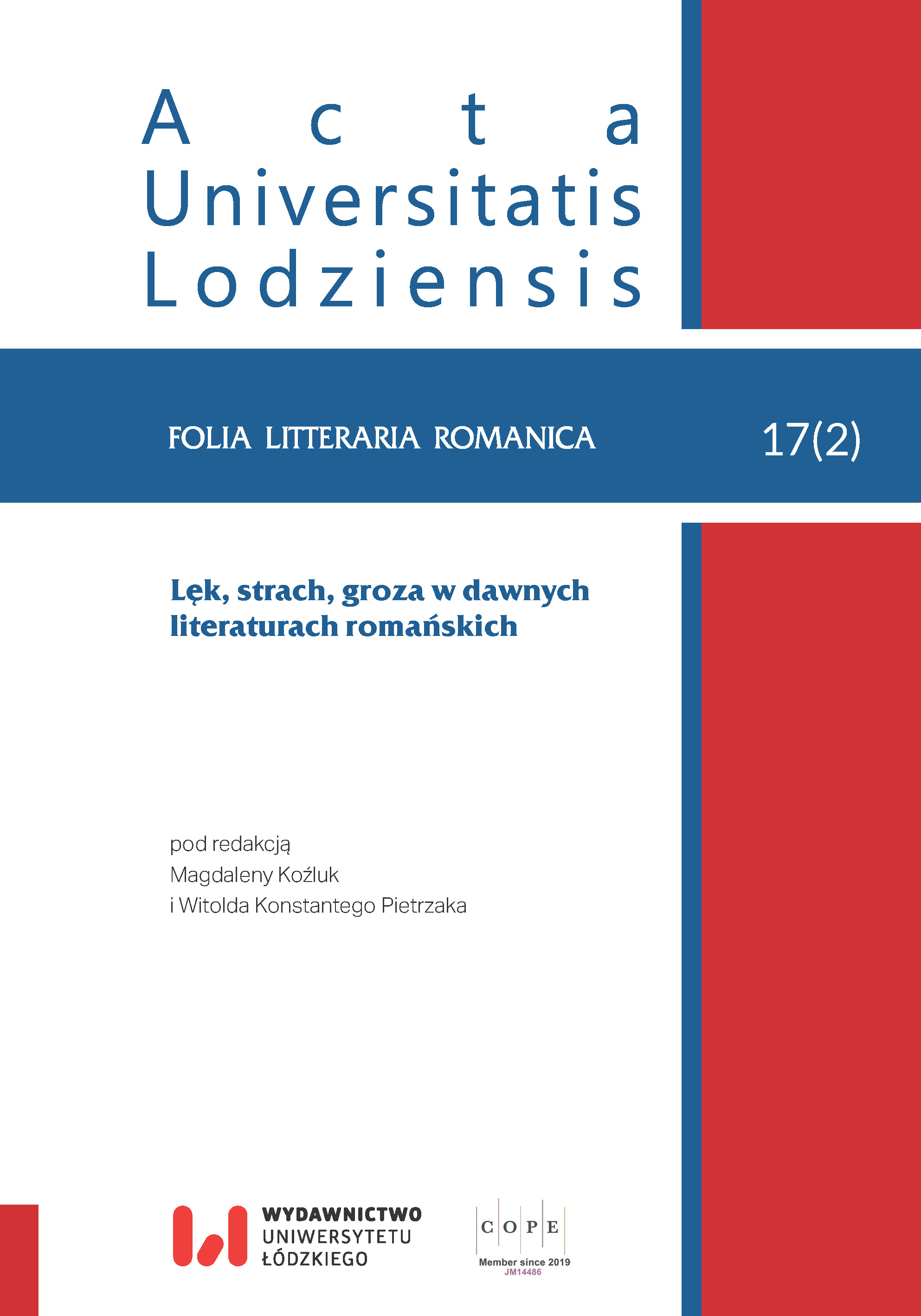Opanować strach – wątki dramatyczne w Astrei Honorégo d’Urfé
DOI:
https://doi.org/10.18778/1505-9065.17.2.13Słowa kluczowe:
Astrée, Honoré d’Urfé, pastoral novel, fearAbstrakt
L’Astrée, a pastoral novel of Honoré d’Urfé abounds in dramatic episodes that shatter the bucolic idyll. The suicide scenes of Damon or Chriséide; the violent context of Placidie’s marriage show the protagonists in traumatic situations. However, they all keep their cool, preferring to act instead of lamenting. Thus Honoré d’Urfé shows readers how to survive dramatic situations. He wrote his novel for readers who had mostly survived the nightmare of religious wars, who were no strangers to dramatic choices, the imminence of death, and who realized that in a critical situation, It was not fear, but action and pragmatism that could save their lives. D’Urfé is an excellent teacher. In the pastoral novel, by confronting its heroes with dramatic choices, it shows readers what kinds of actions are rational and effective, and how life differs from literature.
Pobrania
Bibliografia
Deux visages de L’Astrée. ©2005-2020 Eglal Henein, URL: https://astree.tufts.edu/_analyse/accueil.html, dostęp 8.01.2022
Google Scholar
Honoré d’Urfé, L’Astrée. Première partie, Édition critique établie sous la direction de Delphine Denis, Paris, Éditions Honoré Champion, 2011
Google Scholar
Honoré d’Urfé, L’Astrée. Deuxième partie. Édition critique établie sous la direction de Delphine Denis, Paris, Éditions Honoré Champion, 2016
Google Scholar
Benoît de Sainte-Maure, Le Roman de Troie, tr. et prés. par Emmanuèle Baumgartner, Françoise Vielliard, Paris, Union générale d’éditions, 1987
Google Scholar
Bernard de Girard du Haillan, Histoire de France, Paris, Pierre L’Huillier, 1576
Google Scholar
Berthiaume, Pierre, « Psychodoxie du personnage dans L’Astrée », Dix-septième siècle, 2001/1, no 210, s. 3-18, https://doi.org/10.3917/dss.011.0003
Google Scholar
DOI: https://doi.org/10.3917/dss.011.0003
Dotoli, Giovanni, Littérature et société en France au XVIIe siècle, Paris, Presses de l’Université de Paris Sorbonne, 2004, t. 4
Google Scholar
Fauchet, Claude, Recueil des Antiquités gauloises et françaises, Paris, Jacques du Puys, 1579
Google Scholar
Gaume, Maxime, Les Inspirations et les sources de l’œuvre d’Honoré d’Urfé, Saint-Étienne, Centre d’Études Foréziennes, 1977
Google Scholar
Giavarini, Laurence, La Distance pastorale : usages politiques de la représentation des bergers (XVIe-XVIIe siècles), Paris, Vrin, 2010
Google Scholar
Giavarini, Laurence, « Politique dans l’Astrée, politique de L’Astrée », Les Dossiers du Grihl, URL : http://journals.openedition.org/dossiersgrihl/7438, dostęp 29.11.2020
Google Scholar
Henein, Eglal, Protée romancier : les déguisements dans l’Astrée d’Honoré d’Urfé, Fasano/Paris, Schena/Nizet, 1996
Google Scholar
Horowitz, Louise, « Hybridation dans L’Astrée », in Lire L’Astrée, éd. Delphine Denis, Paris, Presses Universitaires de Paris-Sorbonne, 2008, s. 89-97
Google Scholar
Jakubowska, Joanna, et al., Panorama literatury francuskiej. Wojna a piśmiennictwo, Universitas, Kraków 2020
Google Scholar
Marczuk, Barbara, Krwawy amfiteatr. Antologia francuskich historii tragicznych epoki renesansu i baroku, Universitas, Kraków 2002
Google Scholar
Matzat, Wilhelm, « Tradition et invention dans L’Astrée d’Honoré d’Urfé », Dix-septième siècle, 2002/2, no 215, s. 199-207, https://doi.org/10.3917/dss.022.0199
Google Scholar
DOI: https://doi.org/10.3917/dss.022.0199
Randall, Dale B. J., Boswell, Jackson C., Cervantes in Seventeenth-Century England: The Tapestry Turned, Oxford, Oxford University Press, 2009
Google Scholar
DOI: https://doi.org/10.1093/oso/9780199539529.001.0001
Robic, Sylvie, « Le berger dans un nid de serpents : relectures dévotes de L’Astrée dans l’œuvre de Jean-Pierre Camus », in Audace et modernité d’Honoré d’Urfé, éd. Marie-Claude Mioche, Paris, Honoré Champion, 2013, s. 29-43
Google Scholar
Wergiliusz, Bukoliki, tł. J. Lipiński, Warszawa, druk nr 646 przy Nowolipiu, 1805, s. 36; URL: https://polona.pl/item/bukoliki-publiusza-wirgiliusza-marona, dostęp 9.01.2022
Google Scholar
Wine, Kathleen, Forgotten Virgo: Humanism and Absolutism in Honoré D’Urfés ‘L’Astrée’, Genève, Droz, 2000
Google Scholar
Opublikowane
Wersje
- 2023-08-10 - (2)
- 2022-12-30 - (1)
Jak cytować
Numer
Dział
Licencja

Utwór dostępny jest na licencji Creative Commons Uznanie autorstwa – Użycie niekomercyjne – Bez utworów zależnych 4.0 Międzynarodowe.













